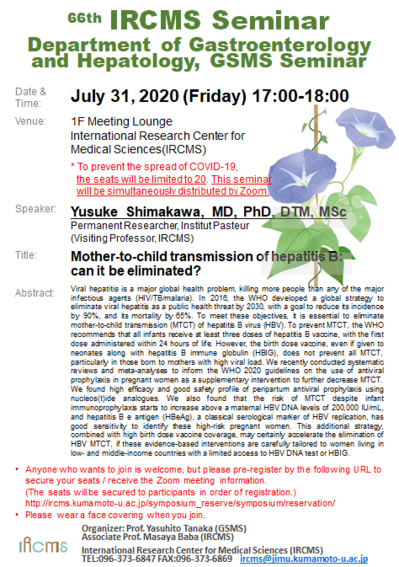Events
[July 31] 66th IRCMS seminar / Department of Gastroenterology and Hepatology, GSMS seminar
July 15 2020
We would like to inform you that the 66th IRCMS seminar / Department of Gastroenterology and Hematology, Graduate School of Medical Sciences seminar has been scheduled as below.
We would be pleased to see many of you participating in the seminar.
Date : July 31, 2020 (Friday)
Time : 17:00-18:00
Venue : IRCMS 1F Meeting Lounge
* To prevent the spread of COVID-19, the seats will be limited to 20.
Please wear a face covering when you join.
* This seminar will be simultaneously distributed by Zoom.
Speaker : Yusuke Shimakawa, MD, PhD, DTM, MSc
Permanent Researcher
Institut Pasteur
(Visiting Professor, IRCMS)
Tilte : Mother-to-child transmission of hepatitis B: can it be eliminated?
Abstract:
Viral hepatitis is a major global health problem, killing more people than any of the major infectious agents (HIV/TB/malaria). In 2016, the WHO developed a global strategy to eliminate viral hepatitis as a public health threat by 2030, with a goal to reduce its incidence by 90%, and its mortality by 65%. To meet these objectives, it is essential to eliminate mother-to-child transmission (MTCT) of hepatitis B virus (HBV). To prevent MTCT, the WHO recommends that all infants receive at least three doses of hepatitis B vaccine, with the first dose administered within 24 hours of life. However, the birth dose vaccine, even if given to neonates along with hepatitis B immune globulin (HBIG), does not prevent all MTCT, particularly in those born to mothers with high viral load. We recently conducted systematic reviews and meta-analyses to inform the WHO 2020 guidelines on the use of antiviral prophylaxis in pregnant women as a supplementary intervention to further decrease MTCT. We found high efficacy and good safety profile of peripartum antiviral prophylaxis using nucleos(t)ide analogues. We also found that the risk of MTCT despite infant immunoprophylaxis starts to increase above a maternal HBV DNA levels of 200,000 IU/mL, and hepatitis B e antigen (HBeAg), a classical serological marker of HBV replication, has good sensitivity to identify these high-risk pregnant women. This additional strategy, combined with high birth dose vaccine coverage, may certainly accelerate the elimination of HBV MTCT, if these evidence-based interventions are carefully tailored to women living in low- and middle-income countries with a limited access to HBV DNA test or HBIG.
- Anyone in Kumamoto University who wants to join is welcome, but please pre-register by the following URL to secure your seats / receive the Zoom meeting information.
(The seats will be secured to participants in order of registration.)
http://ircms.kumamoto-u.ac.jp/symposium_reserve/symposium/reservation/

